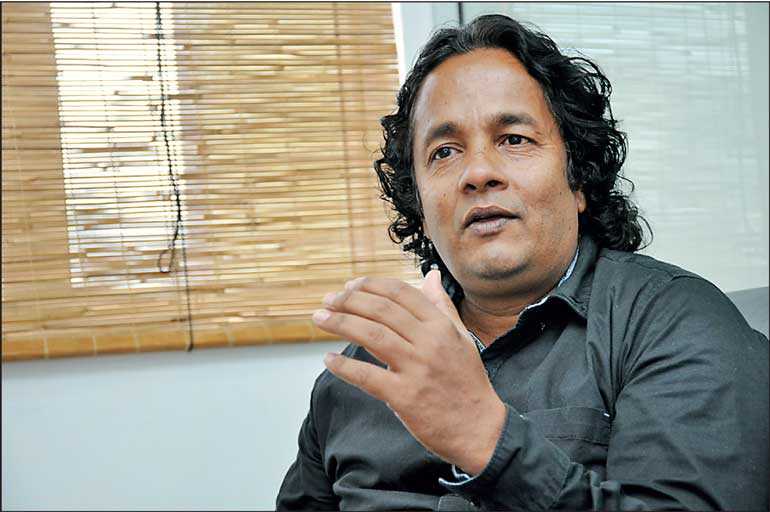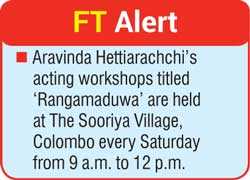Sunday Feb 22, 2026
Sunday Feb 22, 2026
Saturday, 4 January 2020 00:04 - - {{hitsCtrl.values.hits}}

By Shailendree
Wickrama Adittiya
Theatre in Sri Lanka has come a long way from performances in small villages and folk dramas to include modern adaptations of classics, stand-up comedy, and musicals. Due to this variety of genres, theatre is also an art that attracts people of all ages.
There have been concerns, however, of a decline in those joining the industry, especially with the popularity of and opportunities in TV and cinema. There is also criticism that younger generations are not as interested in the classics as they are in modern or contemporary productions.
This is despite drama and theatre being offered as a subject for both Ordinary Level and Advanced Level examinations in Sri Lanka and many schools organising inter-house and inter-school drama competitions.
Since decreasing numbers in actors will ultimately lead to the decline of the industry, efforts are being made by those in the field to attract young actors to theatre and drama as well as the classics.
We are still in a position of defending classical arts. We need a renaissance of the aesthetic arts
Strengthening theatre
Aravinda Hettiarachchi, who has been involved in theatre since the late 1980s, is one such individual and hopes to strengthen theatre in Sri Lanka through his acting workshops titled ‘Rangamaduwa,’ which are held at The Sooriya Village, Colombo every Saturday from 9 a.m. to 12 p.m.
Hettiarachchi also runs the Aravinda Culture Club, through which he hopes to recruit entrepreneurs to teach music, dance, art, sculpture, film, photography, drama, and various other arts around the island.
He is also planning to hold workshops in 50 schools in the Western Province in the coming months in order to train Ordinary Level and Advanced Level students as well as school-leavers to perform an English-language play.
These efforts are likely to produce significant results as Hettiarachchi has the passion, skills, and knowledge to attract young performers to the industry. His experience in theatre and drama is also noteworthy, beginning while he was still schooling.
“If someone asks me when I became an artiste, it is hard to give an answer because I have been involved in the industry since a young age,” he said, explaining that Richard de Zoysa had noticed his performance at the Young Men’s Buddhist Association for a competition in school. He was then asked to join a bilingual drama workshop held at the Lionel Wendt Theatre.
“This was an attempt to mix the higher middle class English speaking theatre with Sinhala theatre,” Hettiarachchi added.
The workshops ended with de Zoysa’s assassination in 1990 but Hettiarachchi’s involvement in both English and Sinhala theatre continued.
“Back then, I was fascinated by ’70s films and wanted to become a showcase to others in drama, theatre, and acting,” he said, adding that studying the subject made him realise that drama was not about showcasing one’s talents alone. “Acting is kind of a social media that can intervene with people’s sense as well as their perceptions,” Hettiarachchi said.
Silence reigns
 Soon, however, a new era would dawn in Sri Lanka with the emergence of electronic media and private radio and TV channels. Following H. R. Jothipala’s death in 1987, discourse on classical art and popular art began.
Soon, however, a new era would dawn in Sri Lanka with the emergence of electronic media and private radio and TV channels. Following H. R. Jothipala’s death in 1987, discourse on classical art and popular art began.
“At that time, we were the young generation and faced a drastic political situation. We wanted to find the real arts and did not want to get involved in television, so we kept silent,” Hettiarachchi said, adding, “This silence lasted decades.”
He now considers this decision to be too radical as those in the edge of their drama circles who got involved in television dramas have now become popular. On the other hand, many artistes who refused to play a role in popular art had to leave the industry entirely.
Classical vs.
popular art
According to Hettiarachchi, the distinction between classical and popular art is in its depth, meaning that the former is an art of perception while the latter is an art of sense.
“You have popular art for people who cannot go to a deeper level and you give them this in order to enter into classical arts,” he explained, adding that popular art always nurtured under classical art. However, electronic art boosted popular art and these events led to the current situation of the arts in Sri Lanka. Hettiarachchi thus emphasised that there is an urgent need to bring back the classical arts in the country as there are very few remaining teachers of the classics.
“We are still in a position of defending classical arts,” he said, adding that Rangamaduwa is one such attempt that he hopes will open a window to discourse on re-establishing classical arts in Sri Lanka. “We need a renaissance of the aesthetic arts,” he further commented.
At that time, we were the young generation and faced a drastic political situation. We wanted to find the real arts and did not want to get involved in television, so we kept silent. This silence lasted decades
Arts require daily practice
While acknowledging the uses of social media and mobile devices, Hettiarachchi also highlighted a lack of skills and technical knowledge among content creators online. “If you go to social media, there are no artistes involved. It’s common people who put out their ideas,” he said, adding that, “Arts require daily practice.”
Through the workshops, Hettiarachchi hopes to teach participants the technical skills and practices required to become so much more than someone that reads off a script, which he said, is what most television actors do today. “There is a big vacuum in the field,” he added.
Although Rangamaduwa has been held since 3 August 2019, participation and response has been quite low due to the lack of publicity on the workshops. “Those who did partake were there to develop their professional careers and not to learn about the industry,” he said, adding that he decided on an English drama workshop in order to attract the elite.
In addition to the Rangamaduwa workshops, Hettiarachchi is also currently working on a play. While 70% of it is complete, the play is about Jesus Christ and the Agony in the Garden of Gethsemane along with inspiration from King Lear.
“It is a dance drama as I think entertainment should come first or people won’t come for plays with deep philosophical meanings,” he added.
While the play will be completed in the coming months, Hettiarachchi is currently gathering sponsors for the drama workshops he plans to hold in schools.
Pic by Lasantha Kumara